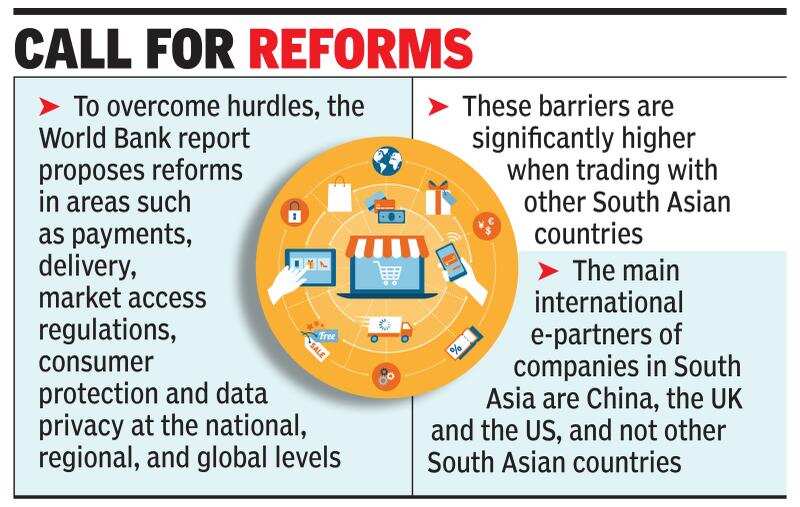NEW DELHI: Overall cost of cross-border logistics, customs clearance of low-value items, and tax & trade barriers in export markets are some of the major issues faced by small and medium enterprises in India in international e-commerce, revealed a report.
 These companies can up their exports, employment and production growth by around 30%, provided these issues are addressed, according to data from the latest World Bank and Cuts International report on e-commerce in South Asia.
These companies can up their exports, employment and production growth by around 30%, provided these issues are addressed, according to data from the latest World Bank and Cuts International report on e-commerce in South Asia.
The report, which surveyed around 2,200 companies across South Asia, stated that online sales accounted for only 1.6% and 0.7% of overall retail sales in India and Bangladesh respectively, compared with 15% in China and 14% globally.

“E-commerce can boost a range of economic indicators across South Asia, from entrepreneurship and job growth to higher GDP rates and overall productivity,” said Sanjay Kathuria, World Bank lead economist and co-author of the report. “By unleashing its online trade potential, South Asia can better integrate into international value chains, increase its market access, and strengthen commercial linkages between countries across the region.”
“Some practical steps to strengthen online transactions include leveraging the reputation of large e-commerce platforms to offer consumer protection, return and redress, and data security as an initial substitute for robust contractual and consumer protection mechanisms, and permitting cross-border ecommerce payments,” said Arti Grover, World Bank senior economist and co-author of the report.
The report also suggests an incremental approach to taking these steps, if necessary, in order to build confidence.
 These companies can up their exports, employment and production growth by around 30%, provided these issues are addressed, according to data from the latest World Bank and Cuts International report on e-commerce in South Asia.
These companies can up their exports, employment and production growth by around 30%, provided these issues are addressed, according to data from the latest World Bank and Cuts International report on e-commerce in South Asia.The report, which surveyed around 2,200 companies across South Asia, stated that online sales accounted for only 1.6% and 0.7% of overall retail sales in India and Bangladesh respectively, compared with 15% in China and 14% globally.

“E-commerce can boost a range of economic indicators across South Asia, from entrepreneurship and job growth to higher GDP rates and overall productivity,” said Sanjay Kathuria, World Bank lead economist and co-author of the report. “By unleashing its online trade potential, South Asia can better integrate into international value chains, increase its market access, and strengthen commercial linkages between countries across the region.”
“Some practical steps to strengthen online transactions include leveraging the reputation of large e-commerce platforms to offer consumer protection, return and redress, and data security as an initial substitute for robust contractual and consumer protection mechanisms, and permitting cross-border ecommerce payments,” said Arti Grover, World Bank senior economist and co-author of the report.
The report also suggests an incremental approach to taking these steps, if necessary, in order to build confidence.
No comments:
Post a Comment